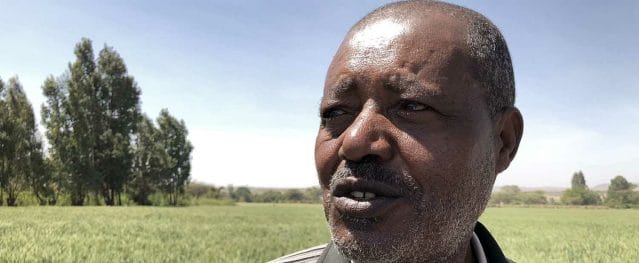Whistles and whips: Technologies for African Agricultural Transformation program results in sounds of success in Ethiopia’s lowlands
(Korofto, Adama District, Ethiopia) If the shrill sounds of policemen’s whistles echoing across Ethiopia’s Awash River Valley do not seem out of place, the crack of whips in the air will have some visitors to these irrigated wheat fields wondering what is going on at this patch of remote farm cooperative.
A short walk through the thigh-high wheat stalks reveals farm workers blowing whistles and waving whips to scare away quelea, a destructive bird species flocking to the fields to peck away at maturing wheat grains.
Farmer Yilma Mamo says the cacophony of sound to rid fields of the birds is actually a testament to success of the Technologies for African Agricultural Transformation initiative, or TAAT.
The TAAT program, launched in 2018, is an integral part of the Bank’s Feed Africa Strategy 2016–2025.

Farmer and TAAT beneficiary Yilma Mama says participating in the TAAT program has made him more financially and food secure.
TAAT’s overall objective is to harness proven technologies to raise agricultural productivity in Africa, as well as mitigate risks and promote diversification and processing in 18 agricultural value chains within eight priority intervention areas. Overall, TAAT will produce 100 million metric tonnes of additional food to feed 200 million people.
In Ethiopia, TAAT is providing tens of thousands of smallholder farmers like Mamo with heat-tolerant wheat varieties that produce more profitable harvests compared to traditional crops like vegetables.
“Over the years, I grew tomatoes, onions, pepper and cabbage. The cost of production was very high and the market for produce was volatile—sometimes we lost money,” said Mamo, who has been farming here since 1969, adding that birds didn’t attack his veg. He explained that the cost of wheat production is very low and “the profits are good”—providing food and financial security for his family and community.
“Scaring the birds away takes a lot of effort. [But] I prefer producing wheat, even though the birds are here,” Mamo said.
[embedded content]
VIDEO – Watch how TAAT program farmers crack the whip and blow whistles to protect their crops.
Mamo is one of more than 28,000 Ethiopian farmers who have received TAAT-funded wheat seed since 2018 with a TAAT Wheat Compact, led by the International Center for Agriculture Research in the Dry Areas, and the Ethiopian National Agricultural Research Institute.
In Ethiopia’s lowlands like Adama District, about 100 kilometers southeast of capital Addis Ababa, wheat farming is relatively new. The Ethiopian government program approached farmers and provided training on growing the heat-tolerant grains where daytime temperatures can reach 35 degrees Celsius. “Before that, we didn’t know wheat could perform well in these areas,” Mamo said.
Farmers receive loans from the government to cover 80% of costs for land preparation, seeds, fertilizer and mechanized equipment for harvesting. The loans are paid back at harvest.

Bank Vice President Beth Dunford (r) and Director Martin Fregene (white shirt) recently visited TAAT beneficiary Yilma Mamo’s farm.
“Heat-tolerant wheat varieties are able to withstand the lowlands’ high temperatures. In essence, these plants can thrive where ordinary wheat varieties would struggle to produce as much grain,” said Dr. Beth Dunford, the Bank’s Vice President for Agriculture, Human and Social Development, following a recent visit to Mamo’s farm. The farm is part of a 280-member farmers’ cooperative.
“It is critical that Africa’s farmers have the technology-enabled tools and knowhow to unleash Africa’s agricultural potential – the Bank’s TAAT initiative is working with our regional member countries to deliver those agricultural technologies to better enable the continent to feed itself,” Dunford added.
In Ethiopia, following the nationwide deployment of heat-tolerant wheat varieties, the irrigated-wheat area expanded from less than 5,000 hectares in the 2018-19 farming season to 650,000 hectares in the 2021-22 season. Wheat yields doubled and Ethiopia’s wheat production increased by an additional 1.6 million metric tonnes in 2022. The country says it achieved wheat production self-sufficiency last year and that it is poised to export wheat for the first time.
“We’re proud of what Ethiopia has achieved. We’ve seen similar TAAT success in Zambia, Ghana, Zimbabwe, Sudan, Kenya and other countries,” said Dr. Martin Fregene, the Bank’s Director for Agriculture and Agro-Industry. “African farmers can feed their countries and build resilience to shocks to the continent’s food systems if they adopt, at scale, improved seeds from the TAAT wheat and other agriculture compacts,” Fregene added.
In July 2022, the Bank Board approved an additional $27.41 million to implement Phase II of TAAT. TAAT aims to make proven technologies available to more than 40 million agricultural producers across Africa – the majority of whom are young people and women in low-income countries – by 2025. This financing supports expansion of the TAAT platform that has also delivered heat-tolerant wheat varieties, drought-tolerant maize varieties and high-yield rice varieties to 11 million farmers, as well as increased crop production by an estimated 25 million tons of additional food.
The TAAT initiative will be one of the African-led solutions increasing the continent’s food production capacity, at the Dakar 2 Africa Food Summit to be held from 25-27 January. President Macky Sall of Senegal, and Chairperson of the African Union, will host the three-day summit. The African Development Bank Group is co-hosting the summit.
To learn more about the Dakar 2 Africa Food Summit, click here.




